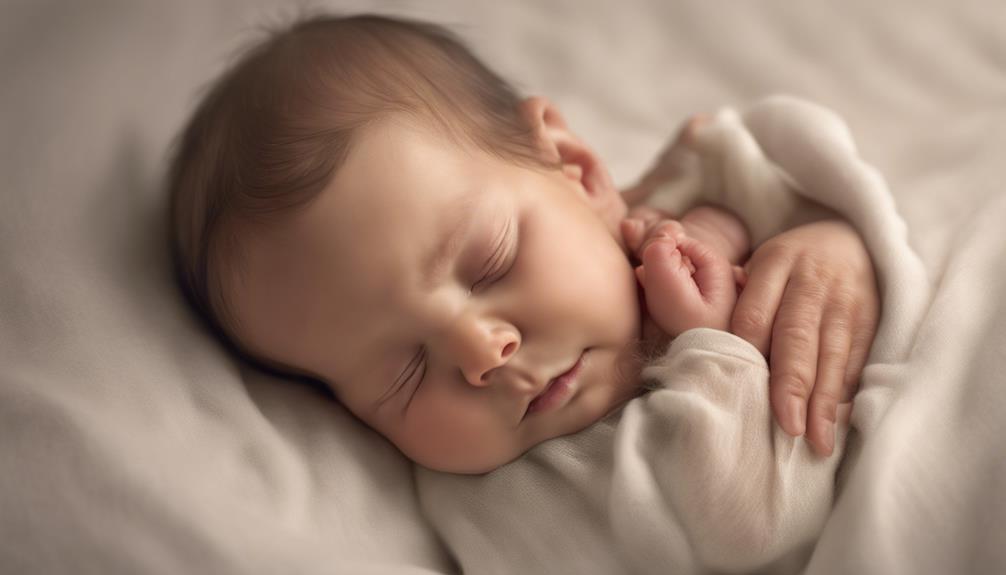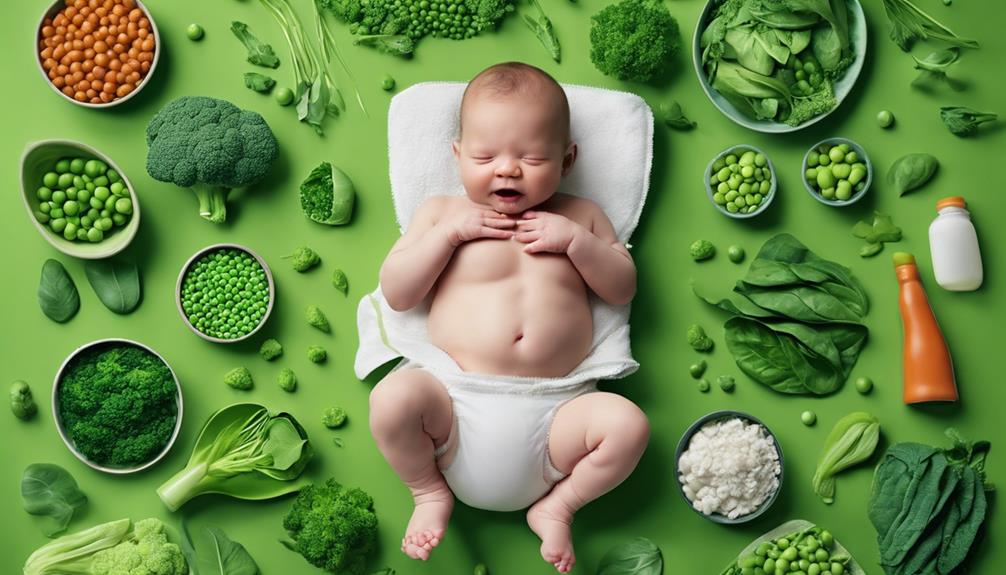If you didn't know, did you realize that newborns can sneeze up to ten times a day on average? Soothing a sneezing or hiccuping newborn can be a puzzling task for many parents.
You may wonder what techniques work best to ease these common occurrences. Let's explore some gentle and effective methods to help alleviate your little one's sneezing and hiccups, providing you with peace of mind and your baby with comfort.
Key Takeaways
- Newborn sneezing clears nasal passages and aids in adjusting to breathing.
- Hiccups help regulate breathing and can be soothed with burping or position changes.
- Persistent sneezing or hiccups may indicate underlying issues and require medical attention.
- Maintaining a clean environment and using calming techniques can help alleviate sneezing and hiccups.

LEVOIT Top Fill Humidifiers for Bedroom, 2.5L Tank for Large Room, Easy to Fill & Clean, 28dB Quiet Cool Mist Air Humidifier for Home Baby Nursery & Plants, Auto Shut-off for Safety, 25H
𝙁𝙖𝙨𝙩 𝙃𝙪𝙢𝙞𝙙𝙞𝙛𝙞𝙘𝙖𝙩𝙞𝙤𝙣 𝘼𝙡𝙡 𝙉𝙞𝙜𝙝𝙩: Runs for up to 25 hours on low thanks to its SUPER LARGE capacity…
As an affiliate, we earn on qualifying purchases.
As an affiliate, we earn on qualifying purchases.
Causes of Newborn Sneezing
Exploring the reasons behind newborn sneezing can provide insight into this natural reflex and help caregivers understand their baby's adjustment to the outside world. Newborn sneezing is a protective mechanism to clear the nasal passages of irritants such as dust or mucus. This reflex not only keeps the airways clear but also assists babies in adjusting to breathing in a new environment after leaving the womb. It's entirely normal for infants to sneeze more frequently in the initial weeks of life as they acclimate to their surroundings.
Understanding that occasional sneezing is a part of your baby's health can alleviate concerns. However, persistent or severe sneezing could indicate a need for consultation with a healthcare provider. By recognizing sneezing as a natural process for newborns to protect their respiratory system and adapt to the world around them, caregivers can feel more at ease and responsive to their little one's needs.

GROWNSY Nasal Aspirator for Baby, Electric Baby Nose Sucker with Larger Suction Chamber and More Powerful Suction, Automatic Nose Cleaner with Music and Light Soothing Function
EFFORTLESS CLEARANCE: GROWNSY's Top-Rated Electric Nasal Aspirator for Babies features 3 adjustable suction levels for customized comfort, features…
As an affiliate, we earn on qualifying purchases.
As an affiliate, we earn on qualifying purchases.
Techniques to Soothe Sneezing

To help soothe your newborn's sneezing, consider implementing gentle methods that promote comfort and ease their nasal passages. Sneezing in newborns is a natural defense mechanism essential for clearing germs and particles from their nasal passages, aiding in maintaining clear airways and supporting respiratory system development. If your newborn sneezes frequently, it could be a sign of underlying health issues that require attention.
Here are some techniques to soothe your newborn's sneezing:
- Keep the environment clean to reduce irritants that may trigger sneezing.
- Use a humidifier to maintain the best humidity levels in the nursery.
- Gently wipe your newborn's nose with a soft, damp cloth to alleviate any discomfort.
- Make sure proper ventilation in the room to promote fresh air circulation.

NISXABEBE Muslin Baby Bibs,Soft Triangular Baby Bandana Drool Bibs for Baby Boy Girl,Solid Colors Bib for Drooling Teething 6 Pack(Unisex)
【Soft & Cozy】: The Nisxabebe bandana bibs front are crafted from muslin,known for its softness.Thanks to muslin's superb…
As an affiliate, we earn on qualifying purchases.
As an affiliate, we earn on qualifying purchases.
Understanding Newborn Hiccups
Understanding newborn hiccups can provide reassurance to parents as they navigate the early stages of their baby's development. Newborn hiccups are a common reflex that helps babies regulate their breathing, even more so for premature babies, who may experience them around 1% of their day, contributing positively to their development.
These hiccups can be triggered by factors such as eating too fast or ingesting air during feeding. Lasting approximately 8 minutes, newborn hiccups are typically harmless and temporary. Seek medical advice if hiccups persist along with symptoms like frequent spitting up, as this may indicate Gastroesophageal Reflux Disease (GERD).

Philips Avent Soothie Baby Pacifiers – 100% Silicone Pacifiers for Babies 0-3 Months, One-Piece Design, BPA-Free, Extra Durable, Green, 4 Pack, Model SCF190/41
Newborn pacifier 0-3 months supporting baby’s natural suckling need: designed to fulfill newborns' natural suckling reflex to self-soothe…
As an affiliate, we earn on qualifying purchases.
As an affiliate, we earn on qualifying purchases.
Ways to Calm Hiccups

When babies experience hiccups, calming techniques such as burping, offering a pacifier, changing positions, and gently rubbing their back can help alleviate discomfort and aid in stopping the hiccups.
- Burping: Patting your baby's back gently during and after feedings can release trapped air in their stomach, which may help relieve hiccups.
- Pacifier: Providing a pacifier for your newborn to suck on can soothe the diaphragm and potentially assist in stopping hiccups.
- Position: Try holding your baby upright or changing their position to help adjust internal pressure and alleviate hiccups.
- Rubbing: Gently rubbing your baby's back in a circular motion can assist in releasing any trapped air bubbles contributing to hiccups.
When to Seek Medical Advice

If your baby's sneezing or hiccups persist despite trying soothing techniques, it may be advisable to seek medical advice to guarantee their well-being.
Frequent sneezing accompanied by breathing difficulty or unusual symptoms warrants contacting your healthcare provider promptly. Similarly, persistent hiccups that interfere with feeding or sleep should prompt you to consult a healthcare professional.
If you notice your baby having difficulty breathing along with sneezing or hiccups, seeking medical attention is important. Additionally, if your baby's hiccups last for hours or if you observe a change in their behavior during sneezing episodes, don't hesitate to seek medical advice.
Contact the pediatrician if your baby's sneezing or hiccups are linked to a fever above 100.4°F. By being proactive and seeking help when needed, you prioritize your newborn's health and well-being.
Frequently Asked Questions
Why Does My Baby Keep Sneezing and Hiccuping?
Your baby keeps sneezing and hiccuping because these are natural processes that help clear their airways and regulate breathing. Sneezing removes irritants, while hiccups aid in breathing control. It's usually normal, but persistent hiccups may warrant monitoring.
What to Do if Newborn Keeps Sneezing?
When your newborn keeps sneezing, fret not! Just like a gentle breeze rustling leaves, sneezes can clear their tiny nose. Keep an eye on any changes, and if worried, seek help for peace of mind.
How Can I Help My Newborn With Hiccups?
When your newborn hiccups, try burping them, offering a pacifier, changing positions, or gently rubbing their back. Avoid adult remedies like startling them. These simple actions can help ease your baby's discomfort and stop the hiccups effectively.
Is It OK to Let Baby Sleep With Stuffy Nose?
It's generally safe for your baby to sleep with a stuffy nose, as long as they can breathe comfortably. Elevate their head slightly, use a cool-mist humidifier, and keep their sleep environment clean. Monitor closely for any breathing issues.
Conclusion
To sum up, remember to trust your instincts as a parent when caring for your newborn.
By understanding the causes of sneezing and hiccups, and utilizing simple soothing techniques, you can help your little one feel more comfortable.
Whether it's offering breastfeeding for hiccups or simply being attentive to any changes in behavior, your care and attention are key in ensuring your baby's well-being.
Stay informed, stay calm, and enjoy these precious moments with your newborn.









